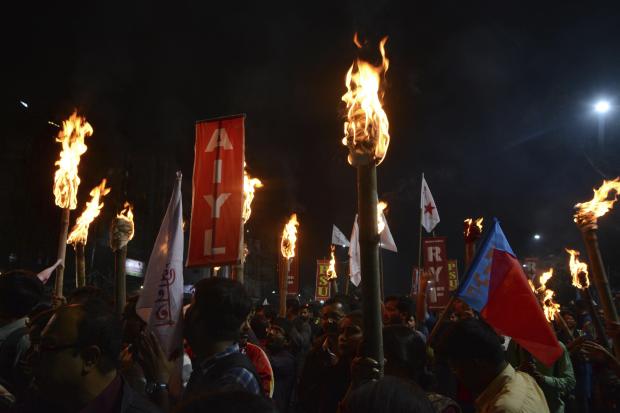India’s Supreme Court delays hearing citizenship law pleas

Activists of left student organizations light torches during a protest against a new citizenship law in Kolkata, India, Tuesday, Dec. 17, 2019. Indian student protests that turned into violent clashes with police galvanized opposition nationwide on Tuesday to a new law that provides a path to citizenship for non-Muslim migrants who entered the country illegally from several neighboring countries. (AP photo)
NEW DELHI — India’s Supreme Court on Wednesday postponed hearing pleas challenging the constitutionality of a new citizenship law that has sparked opposition and massive protests across the country. The court said it would consider the pleas on Jan. 22.
Protests and widespread condemnation have been growing against the Citizenship Amendment Act, with demonstrations erupting in India over the last week.
The new law applies to Hindus, Christians and other religious minorities who are in India illegally but can demonstrate religious persecution in Muslim-majority Bangladesh, Pakistan and Afghanistan. It does not apply to Muslims.
Critics say that the new law is part of Prime Minister Narendra Modi’s Hindu nationalist-led government’s agenda to marginalize India’s 200 million Muslims, and that it goes against the spirit of the country’s secular constitution. Modi has defended it as a humanitarian gesture.
The law’s passage last week follows a contentious process in northeastern India’s Assam state intended to weed out people who entered the country illegally known as the National Register of Citizens, or NRC. Nearly 2 million people in Assam were excluded from the list, about half Hindu and half Muslim, and have been asked to prove their citizenship or else be considered foreign. India is building a detention center for some of the tens of thousands of people the courts are expected to ultimately determine have entered illegally. Modi’s home minister, Amit Shah, has pledged to roll out the exercise nationwide.
Article continues after this advertisementSome Indian Muslims fear it’s a means by which Hindu nationalists can put them in detention or deport them from the country.
Article continues after this advertisement“Overthrow NRC!” protesters chanted Wednesday outside New Delhi’s Jamia Millia Islamia University.
The citizen law was also passed as an unprecedented crackdown continued in Kashmir, India’s only Muslim-majority area, after the region was stripped of special constitutional protections and its statehood in August. Since then, movement and communications have been restricted in the region.
Students have led a week of protests since the law’s passage, including at predominantly Muslim Jamia Millia University, where a march on Sunday descended into chaos when demonstrators set three buses ablaze. Police responded with rubber bullets and tear gas. Video showed officers chasing unarmed protesters and beating them with sticks.
Scores of students were injured. Police say they acted with restraint.
The police response to the protests has drawn widespread condemnation. It has also sparked a broader movement against the Citizenship Amendment Act. Demonstrations have erupted across the country, with thousands rallying in West Bengal, Tamil Nadu and Karnataka states on Tuesday.
On Wednesday, authorities tightened security restrictions, implementing a curfew in Assam, where ongoing protests have disrupted daily life in Gauhati, the state capital. They also restricted assembly in a Muslim neighborhood in New Delhi where demonstrators on Tuesday torched a police booth and several vehicles.
/atm